
The strength of weak ties
The theory of networks, not in the focus of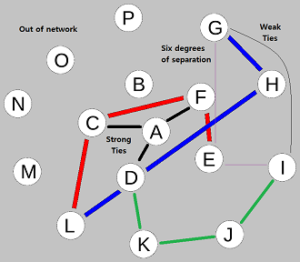 social media, but of the ties between actors has some curious properties and two are very special: the six degrees of separation and the strength of weak ties (Weak ties) that seem strange to those who are unaware the theory.
social media, but of the ties between actors has some curious properties and two are very special: the six degrees of separation and the strength of weak ties (Weak ties) that seem strange to those who are unaware the theory.
The six degrees of separation indicate that seen as networks, the relationships between social actors are, in reality, more connected than one imagines, and this is not just in the world of social media (which is incorrectly put equivalent with social networks).
A classic experiment, called the Milgram experiment due to the work of psychologist Stanley Milgram, who sent letters to certain distant people, and identified ties of personal knowledge existing between any two people, and discovered an average distance of 5.5 people to letters reach their destination.
The experiment had flaws, such as letters that were not sent forward and ended up in an intermediary and the lack of knowledge of the objective of certain people in the experiment, for example, not understanding that the letter should go as close to the final destination.
The weak ties experiment carried out by Mark Granovetter (1973) takes into account the weakest and most distant contacts in social networks, and can, in certain contexts, mean that the ties between two people who have similar interests are strong, even if they pass by some intermediary C, and this makes C also part of the strong loop.
So the weak tie will be just the opposite, A and B have distant interests and connection routes, which can mean different or just distant interests, however in network theory these ties are important for the functioning of the network and its dynamization, unlike the what common sense says.
What Granovetter researched is that the greater the strength of the bond between two people, the greater the chance that the circle of friends and ties will be common and that the message will only stay in that circle, not reaching other circles of relationships and expanding the network.
In this sense, limiting or banning social networks means reducing and making the social network (which is not necessarily done via the media) limited, however, there are networks that commit certain crimes and should not be legitimized and, when possible, banned.
This is discussed within the issue of power, because the theory of networks contradicts the idea of an increasingly stronger and centralized power as a solution to social problems, because even if prohibited, social networks continue to function as established by the theory of the six degrees of power. Separation and distance between actors is smaller than centralized power assumes, as it is often isolated in its social or ideological “bubble”.
Social networks dynamize the structures of social ties and ignoring them can be a source of empowerment for different social groups and helps to grow true popular will.
GRANOVETTER, Mark S. The Strenght of Weak Ties. The American Journal of Sociology, vol. 78, n. 6, p. 1360-1380, may 1973.
Arbitrary power and socialization
In his book “In the swarm: a digital perspective” Byung Chul-Han 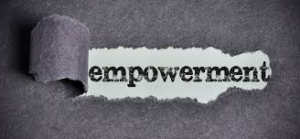 clarifies that only a relationship is symmetrical (both sides have the same power or the same power) respect, if respect is lacking there is always an arbitrary exercise of power , but let’s look at other definitions.
clarifies that only a relationship is symmetrical (both sides have the same power or the same power) respect, if respect is lacking there is always an arbitrary exercise of power , but let’s look at other definitions.
A widely used one is that of Norberto Bobbio: “… every probability of imposing one’s will in a social relationship, even against resistance, whatever the basis of this probability (Weber, 1994, p.33), there is always the possibility of “manipulation”, use of reward, threat of punishment and other forms of asymmetry that favors force.
Generalizing the different forms of power, and contrary to Foucault (see the previous post), Lebrun says that power and domination go hand in hand, a person has power when the other is deprived of it, he puts them in the same boat: m Marx, Nietzsche, Weber , Raymond Aron, Wright Mills and others.
This conception comes from North American sociology known as “Zero Sum Theory”, a theory that dates back to Hobbes, which defined the power of the “sovereign” or the State, as being “one against all” and “in favor of all at the same time”. time”, but from top to bottom.
Thus, this power is simply applied as an obligation or prohibition to the dominated, passing through them and through them, in the same way, the dominated also use it and rely on it, but the dominated have subjectivity (in the ontological relationship it is dasein), and they produce new knowledge about power relations and also empower themselves. In this sense, it is important to relate power to potency, or capacity for action.
The concept of act and power in Thomas Aquinas is, however, more complete, because it is also related to truth, not temporal, but ontological, present in Being:
“[…]some things may be, although they are not, while others actually are. What can be (illud quod potest esse) is called potential being; what already is (illud quod iam est) is called being in act. However, being is double: the essential or substantial being of the thing, like being a man, is simply being; the other is being accidental, like the man being white; and that is being other.” (AQUINO, T, 1976, p. 39.)
Thus power is seen in another way, which is also matter and being complete, for Aquinas all are basic components of the substance, the notion of being complete is attributed both to the form that signifies the first act, the actuality, that the form possesses by itself and not by a mediator, when this first act is attributed to matter there will be an actuality, that which today is confused with virtuality (the potency or possibility of being), because in this way every being is in potency, in this way everyone can have power in order to realize its full potential.
This means that it is necessary to empower man, society and recover the disempowered, so re-education, resocialization and even those who are socialized are always possible.
Power, if exercised without arbitrariness and with the dimension of everyone, can and should serve the common good, justice and freedom.
AQUINO, T. (1976) De principiis naturae ad fratrem Sylvestrum, [ed. H.F. Dondaine]. Ed. Leon., t.XLIII, Opuscula, vol.IV. Roma [Santa Sabina]: Editori di san Tommaso.
LEBRUN, G.(1999) O que é poder. Brazil, São Paulo: Brasiliense.
WEBER, M. (1994) Economia e Sociedade. Brazil, Brasília – DF: Editora da Universidade de Brasília, 1994.
Power in Foucault and Chul-Han
Michel Foucault broke with the classical conceptions of the term power and defined it as a network of relationships where all individuals are involved, and we understand the network here with the modern sense of network, although it was vague in his time, individuals are both generators and recipients of power. movement of these relationships, however he identifies them as biopower, while Chul-Han identifies them as psychopower, and in a way adds the media to this.
conceptions of the term power and defined it as a network of relationships where all individuals are involved, and we understand the network here with the modern sense of network, although it was vague in his time, individuals are both generators and recipients of power. movement of these relationships, however he identifies them as biopower, while Chul-Han identifies them as psychopower, and in a way adds the media to this.
State ideology, born from Hegel, is the basis of every history of contemporary power, authoritarianism and modern wars were born from a new idea of imperialism and colonialism, in which stronger states control power not only through weapons, but rather through biopower and now psychopower.
Foucault’s biopower, the state is the first level of power (he calls it a sector), the market is the second level, and the third is civil society, the idea of 4th. The power of the press comes from there.
He studied power not to develop a theory about it, but to identify aspects of subjectivity (in ontology it would be the question of Being), that is, subject over other subjects.
This is important to differentiate him from Chul-Han, who starts from the ontological relationships between beings and identifies the action of media and media structures that act on the psychology of power, so his idea of power (What is power) is like a domination technique that stabilizes and reproduces the dominated system through programming and psychological control.
Foucault sees biopower, as in the body as a training machine, since biopolitics, in the middle of the 18th century, was focused on regulatory controls on the population, the idea being that it was the population increase that caused misery and hunger.
Peter Sloterdijk, who supervised Chul-Han’s doctoral thesis on Heidegger, argues that this “training” process failed and thus, the control process develops towards the fourth power, which Chul-Han focuses excessively on the media, forgetting the 4th. power of the press, TV and cinema that had an enormous influence.
He develops pathologies of self-centeredness (narcissism), emotional instability (borderline) as responses to the demands of a society intoxicated with demands for efficiency, appearance and disciplinary coercion, wrote the author):
“The violence of decapitation is inherent to the pre-modern society of sovereignty; its medium is blood. Modern disciplinary society is, to a large extent, a society of negativity, being governed and dominated by disciplinary coercion, that is, by ‘social orthopedics’. Its form of violence is deformation. But neither decapitation nor deformation are capable of describing the postmodern performance society. It is dominated by a violence of positivity, which confuses freedom and coercion. Its pathological manifestation is depression” (Han 2018, pp. 183-184).
HAN, Byung-Chul. (2018) Psicopolítica: o neoliberalismo e as novas técnicas de poder. Brazil, Belo Horizonte: Âyiné.
A piece in the chess of war
Since the fall of the monarchy in Iran, at the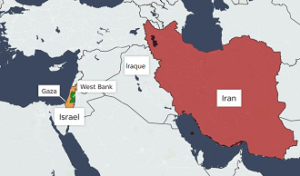 time Shah Reza Pahlavi, who was a traditional ally of the USA, the Islamic republic of Iran began to have hostility with the USA, which imposed sanctions because of the processing of uranium essential for nuclear bombs, making causing Iran to seek support and form alliances with Russia.
time Shah Reza Pahlavi, who was a traditional ally of the USA, the Islamic republic of Iran began to have hostility with the USA, which imposed sanctions because of the processing of uranium essential for nuclear bombs, making causing Iran to seek support and form alliances with Russia.
In 1st. April this year, Israel launched an attack on Syria (not assumed), killing Iranian generals, who have since promised retaliation and recently attacked Israel’s territory with drones and missiles, according to Rear Admiral Daniel Hagari, Israeli military spokesman: “it will launched more than 300 threats, and 99% were intercepted”, and concluded: “this is a success”.
Shortly before the news of the launch this Saturday (13/04), Israeli Prime Minister Benjamin Netanyahu said that “the defensive systems” are working, and that the IDF (Israel Defense Force), in a reprisal that was already As expected, the bombers continued yesterday (04/14).
As there are strong connections with Hezbollah and the Houthis to the south in Yemen and Hezbollah to the north in Lebanon there is also news of attacks on Israel, both the Israeli military command, the G7 and the UN security council have already called a meeting yesterday.
Italy and Germany have already spoken out against Iran, condemning the attacks, the USA and France helped intercept the missiles (it is reported that Jordan also helped the defense), so Iran is isolated in the West.
The objective at the moment is to prevent a larger scale attack on Iran, which would trigger an escalation of war in the region, Netanyahu must attack some targeted targets in Iran.
Russia has not commented so far, but it is a traditional ally of Iran, and the drones used in the attack on Israel are the same type as those used in the war in Ukraine.
Russian attacks continue to escalate in Ukraine with the main objective of depleting the country’s energy sources, the progressive fragility of the defense of Ukraine’s military forces makes the situation in the country, and to a certain extent in the NATO countries, quite dramatic.
Peace is always possible, what ethical forces call responsibility could play a decisive role in decision-making, as the leaders involved in the conflict increasingly seem not to understand the gravity of a conflict in the midst of a civilizational crisis.
After World War II, the forces in conflict understood the need for peace, now the worsening of the crisis, paradoxical as it may be, can make leaders call for peace.
Overcoming fear by having hope
It is common to hear in everyday life, there is no way, everything is really lost, in difficult days for all humanity, it seems impossible to believe in a future full of light and happiness, however, both in philosophy and in true spirituality there is a spirit of resistance: the hope.
no way, everything is really lost, in difficult days for all humanity, it seems impossible to believe in a future full of light and happiness, however, both in philosophy and in true spirituality there is a spirit of resistance: the hope.
So many times in history we seemed close to the end, the ancient empires, the great wars and the two recent “world wars” are not a mere chance, and they were also not without a lot of death, sadness and disappointment, but the worst thing is that we did not have the lucky to understand that scourge.
We don’t know how to deal with pain, with disappointment, with “no” and we want at all costs to be the winners in any dispute, even sporting ones that should only be a reason for joy and distraction, can become a war due to the lack of healthy spirit of competition.
In Palliative Society: Pain Today, Byung Chul-Han writes: “The palliative society is a society of enjoyment. It degenerates into a mania of enjoyment. The like is the sign, the painkiller of the present. It dominates not just social media, but all spheres of culture. Nothing should cause pain”, we want something that will immediately “cure” or suppress any pain or even a small amount of suffering.
The author creates a verb based on new media: “Not only art, but also life itself has to be Instagrammable; that is, free from angles and corners, from conflicts and contradictions that could cause pain. We forget that pain purifies”, and fear brings light to consciousness.
How to beat him? Have you ever stopped to try to answer this question? with Hope, not that of those who wait and do nothing, but that of those who stop and meditate on pain, also on those who suffer injustices, judgments and who should occupy our consciences.
The resistance of the Spirit, which Edgar Morin advocates for today, is also a spirit of Hope, because spiritual exercise would be worthless without a belief in a better future for all, of peace, justice and acceptance. the differences.
In the biblical narrative, when the disciples saw the resurrected Jesus “walking on the sea”, they were afraid and did not fully understand his iconic meaning, but the master said (John 6:19): “Take courage, it is I”, and approaches them , a new force came precisely after this “fear”.
Infinity is not just “believing”
Having moral and religious concepts does not always mean that we overcome fear, anguish and the difficulties of life, fervent prayers and preaching can cover up the truth, this keeps many people away from believing in happiness and eternal life.
always mean that we overcome fear, anguish and the difficulties of life, fervent prayers and preaching can cover up the truth, this keeps many people away from believing in happiness and eternal life.
When something from the infinite touches us in life, not only do we discover the truth, not only a belief in someone (something is to reify the eternal) who is already part of our existence, this invigorates us and makes us capable of helping the world of peace, of hope and true Love.
We know in our hearts that no one can truly probe and know our soul, however, someone peers into our interior, when we love and do something good for others, for ourselves and for humanity, something good invades our being and gives us serenity.
This strength that awakens within led great sages, masters and saints to discover something new that made them progress in true asceticism, they were capable of heroic attitudes, but curiously with less weight than it would be for men who do not know this Love.
When we truly live this dimension, even a certain type of routine and bureaucratic religiosity abandons us, we want to see the Other grow, we want to listen to them and love them as they are.
This way we overcome fear with positive attitudes towards the world and other people, so that what is really True, that is, the human and divine good within us, also manifests itself outside and there is no fear, no anguish because it is a True Good.
The opposite, the constant opposition to the Other, the feeling of always highlighting the difference and the arrogance of being superior in something we do well or better than others, although it seems true, brings with it a feeling that distances us from the Other and from humanity, It is not peace.
If we look at wars, we will always see this principle, seeing others as inferior and smaller than us, so they are not worthy of living, they “deserve” all the evil that is deep down within us and not in these people, the majority of whom are innocent, even if Within each people or nation there are people who would not be worthy of our good wishes, it is not by eliminating them that we build peace.
True peace among men is born from a serene heart, which understands the infinite, and which longs, even in the distant future, for a better life for all, without injustice and wars.
Happiness, fear and serenity
Among the main guests of “Fronteiras do Pensamento” is Luc Ferry, still little known in Brazil, and already with a certain exponent in Europe he also spoke about fear, one of our themes this week.
Pensamento” is Luc Ferry, still little known in Brazil, and already with a certain exponent in Europe he also spoke about fear, one of our themes this week.
He defends a secular spirituality, which for me and other Christians is fragile, but some of his reasoning and comments are important, for example about happiness: “… it does not exist, we have moments of joy, but there is no permanent state of satisfaction… What we can hope for is serenity, something completely different. Serenity can only be achieved by overcoming fear” (interview with Fronteiras do Pensamento).
It classifies fear into three types: shyness (arises depending on the environment and society), phobia (fear of the dark, insects, being trapped in an elevator), in our view it is the only one that really encompasses itself within what the author works mainly: psychology, and the third is the fear of death (of the people we love and of our own death), in our view this necessarily refers to the finitude of life and man, it is only possible to transcend with a spirituality not secular.
He cites an important author, Hans Jonas, and his book The Principle of Responsibility, where there is a chapter called Heuristics of Fear, described as a positive and useful passion.
Through reading this author gives a positive reading: “Ecology inverts this philosophical tradition by maintaining that fear is the beginning of a new wisdom and that, thanks to fear, human beings will become aware of the dangers that exist on the planet. Fear is no longer seen as something childish, but as the first step on the path to wisdom.”
If we are not afraid of war, of an atomic catastrophe, of a desertified planet, of the hunger already present in poor people and countries, we will not have social responsibility, most of us (who do not experience these fears) imagine that they will never be affected, however it’s not like this.
He recognizes that religion also addresses this issue, but his secular spirituality states that: “except that the great philosophies are doctrines of salvation without God and without faith”, so the question remains how to overcome finitude and death, and whether the resurrection of Jesus is true?
Of course it is a question based on faith, but the men of that time saw, witnessed and gave testimony, so why not bet on faith as Pascal proposed, what would you lose with this “bet”, of course it is important to go further, but it could be a first step.
What do I gain today with this bet, is a simple answer, more peace and more conviction of the possibility of peace, of not needing to destroy to discover that we chose death and fear?
Luc Ferry – A boa vida – YouTube
Fear, society and hope
Fear is not something of these days and perhaps of contemporary society, it is not, however, something transitory or even impossible to be overcome.
of contemporary society, it is not, however, something transitory or even impossible to be overcome.
In different societies and thoughts they were elaborated, in ancient classical thought
It is a mistake to think that tiredness, pressure and fear are current problems, they have been present in our society for some time: competition and the demand for perfection are present in the history of humanity.
Heidegger (1889-1976) stated this way (not literal here): fear invites us
living in impropriety, we don’t attribute meaning, we let others and circumstances attribute it, we alienate ourselves from ourselves, we always live on the run, with our schedules full of distractions that occupy us.
For some, it is a more phenomenological and practical way of seeing fear, as Pascal and Kierkegaard would have a more theological fear, but there is a theological mistake “fear of God” is not necessarily a fear, but rather respect, after all the first Christian commandment is to love God above all things.
So seeing fear as a “thing”, the phenomenological sense of Heidegger and others does not suppress the theological vision, a thought limited to man will also limit his existence to this world being a limited intellect.
Kierkegaard’s work “The Concept of Anguish”, remembering that we made a post about this, has a demand for questions, many are asked in relation to the “fear of death”, which in a certain sense is a fragile theological issue, whereas Pascal’s work There is also a tendency to “take a chance on God”, when thinking about the soul.
The philosopher says: “The immortality of the soul is something that worries us so much, that touches us so deeply, that we must have lost all feeling to remain indifferent before it.”, he does not, therefore, affirm its immortality, but rather in the face of doubt.
For Heidegger, it is more than a psychological and ontic phenomenon; it has an ontological dimension, as it refers us to the totality of existence as being-in-the-world, but anguish man only exists if he can have an understanding of Being, although he does not say so, it is a reality beyond “thing”, Hannah Arendt, his disciple, will say beyond the vitta activa.
The contemplative vitta (see also Byung-Chul Han) leads us to awareness of the Being, it is a path to overcoming fear and anguish.
Eminent danger of war and hope for peace
A drone attack on the Zaporizhzhia plant last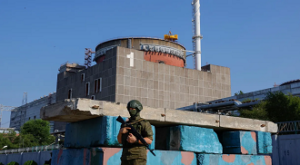 week triggered an alert from Russia that promptly denounced the danger and consequences of a nuclear disaster would be dire.
week triggered an alert from Russia that promptly denounced the danger and consequences of a nuclear disaster would be dire.
It was not clear exactly what weapon was used against the nuclear plant (photo), only that they were drones and that one had been detonated on site. The International Atomic Energy Agency (IAEA), which has experts on site, said only that the information was “consistent” with the entity’s observations, that is, a drone had exploded near the Plant.
International analysts still see the conflict as unlikely due to the catastrophic risk due to the possibility of using nuclear weapons, in addition to conventional combat, the use of cyber and hybrid attacks would be put into motion, initially in Eastern Europe, but with the risk of expanding to Europe and other continents.
Even though NATO holds a significant advantage in both geopolitics, Finland and Sweden joined NATO and Hungary, which sought a position of neutrality, is now strengthened with a military technology agreement made with Sweden, which facilitated its entry into NATO.
Russia, however, has military capabilities combined with economic resources and the modernization of its military apparatus, in addition to a support agreement with China and North Korea, so maintaining peace and preventing conflicts must be done through constant dialogue, but Russian diplomacy continues to play hard and says that dialogue with NATO is “zero”.
Both Russian Foreign Minister Sergey Lavrov and Kremlin spokesman Dimitry Peskov make statements that imply that the conflict with NATO is already underway, diplomatic strategy or pure rhetoric, the fact that tension levels are rising .
NATO responds with military exercises and troop movements on the borders, in January an exercise involved 90 thousand soldiers, new training was announced by NATO commanding general, Christopher Cavoli, the operation called Defensor Firme 24 (Steadfast Defender 24) had already been carried out in other years, but now it takes place amid an intensification of bombings against Kiev.
The hope is that the balance is fragile and both sides know this, and the risk of war would be catastrophic, even though analysts avoid saying that there would be limits on actions.
Polycrisis and hope
Rumors of confrontation between Russia and NATO have worsened in the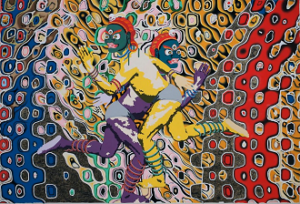 last few hours, however, the hope for peace and the resistance of the Spirit, as portrayed by Edgar Morin, remain alive.
last few hours, however, the hope for peace and the resistance of the Spirit, as portrayed by Edgar Morin, remain alive.
In addition to Morin’s polycrisis (just as poly is multiple and is also city polis, Krisis also has the meaning of decision-making power) professor Adam Tooze (Financial Times article), of history at Yale University (USA) expanded and updated: pandemics, droughts, floods, mega storms, forest fires, war in Ukraine (and now in the Gaza strip0, energy and food prices, etc.
In his reasoning, without directly pointing out the professor “discovers” the complexity and a new transdisciplinary vision of the “whole”: “A problem becomes a crisis when it challenges our ability to deal with it and, thus, threatens our identity. In a multiplicity of crises, the shocks are differentiated, but they interact in such a way that the whole is more ambiguous than the sum of its parts”, he states in the article. (in the image the painting by Tsherin Sherpa (Nepal), Lost Spirits, 2014.)
Morin said: “Linked to the domain of calculation in an increasingly technocratic world, the progress of knowledge is incapable of conceiving the complexity of reality and in particular human realities. The result is a return to dogmatism and fanaticism, and a crisis of morality while hatred and idolatries spread” (Newspaper La Repubblica, interview), however, beyond the polycrisis there are signs of hope.
While the Resistance of the Spirit invokes an understanding of the gravity and issues surrounding the current crisis, Hope (capitalized here) means this Spirit put into action and thus the achievement of a countercurrent spirituality that invokes values of change.
Those who immerse themselves in this Hope in different ways, are always willing to embrace the problems that everyone runs away from, to embrace the fragments of a polarized world, and to remember what unites as opposed to what disunites and polarizes, fortunately there are these spirits and I would call them Spirits of Resistance through Hope.
Go to the World and Bring the Good News, it cannot just be a biblical key, it is Living Hope.

